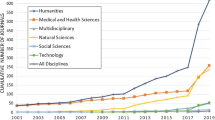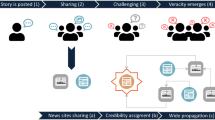Abstract
As predatory publishing has influenced the educational research community, this study sought to understand and articulate current predatory publishing practices which may render important academic research “post-truth” or “fake news” if authors are not careful where they publish and with whom. Findings suggest predatory publishers obscure publication charges, steal identities of real scholars and position them as editors of predatory journals, mimic website aesthetics of credible journals, and gather author information to further promote predatory publishing and fake academic conferences. Future research and viability of open-access publishing are addressed, as well as a discussion of academic publishing, predatory publishing, and the pressure graduate students and junior researchers often experience during the “publish or perish” process of tenure and promotion.
We’re sorry, something doesn't seem to be working properly.
Please try refreshing the page. If that doesn't work, please contact support so we can address the problem.













Similar content being viewed by others
References
Oxford University Press. Post-truth. 2018. https://en.oxforddictionaries.com/definition/post-truth.
Cowell JM. Importance of peer review. J Sch Nurs. 2014;30(6):394–5. https://doi.org/10.1177/1059840514557235.
Beall J. Predatory Publishing Is Just One of the Consequences of Gold Open Access. Learn Publish. 2013;26(2):79–84. https://doi.org/10.1087/20130203.
Bowman JD. Predatory publishing, questionable peer review, and fraudulent conferences. Am J Pharm Educ. 2014;78(10):1–6. https://doi.org/10.5688/ajpe7810176.
Eve MP, Priego E. Who is actually harmed by predatory publishers? TripleC. 2017;15(2):755–70. https://doi.org/10.31269/triplec.v15i2.867.
Chawla DS. The Undercover Academic Keeping Tabs on ‘Predatory’ Publishing. 2018. https://www.nature.com/articles/d41586-018-02921-2.
Hoffecker L. Cabells scholarly analytics. J Med Libr Assoc. 2018;106(2):270–2. https://doi.org/10.5195/jmla.2018.403.
Van Nuland SE, Rogers KA. Academic nightmares: predatory publishing. Anat Sci Educ. 2017;10(4):392–4. https://doi.org/10.1002/ase.1671.
da Silva T, Dobránszki JA. Multiple versions of the H-index: cautionary use for formal academic purposes. Scientometrics. 2018;115(2):1107–13. https://doi.org/10.1007/s11192-018-2680-3.
Vogel L. Researchers may be part of the problem in predatory publishing. CMAJ. 2017;189(42):1324–5. https://doi.org/10.1503/cmaj.109-5507.
Gardner SK. The development of doctoral students–phases of challenge and support. In: Report no. 6. N.p., 2009. https://eric.ed.gov/?id=EJ835648.
Dooley MD, Sweeny K. The stress of academic publishing. 2017. https://www.chronicle.com/article/The-Stress-of-Academic/241156.
Scimago Lab. Scimago journal and country rank: education. 2018. https://www.scimagojr.com/journalrank.php?category=3304.
American Educational Research Association. AERA Open: Submission Guidelines. 2018. https://us.sagepub.com/en-us/nam/journal/aera-open#submission-guidelines.
Author information
Authors and Affiliations
Corresponding author
Additional information
Publisher's Note
Springer Nature remains neutral with regard to jurisdictional claims in published maps and institutional affiliations.
Rights and permissions
About this article
Cite this article
Taylor, Z.W. The Hunter Became the Hunted: A Graduate Student’s Experiences with Predatory Publishing. Pub Res Q 35, 122–137 (2019). https://doi.org/10.1007/s12109-019-09639-7
Published:
Issue Date:
DOI: https://doi.org/10.1007/s12109-019-09639-7




